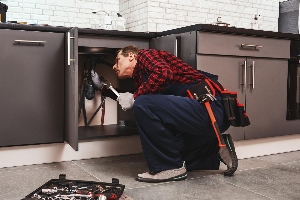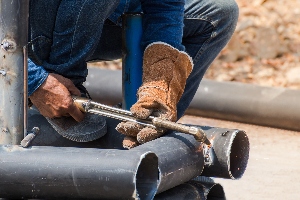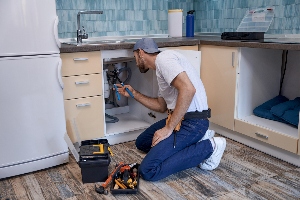Water Heater Corrosion: Causes, Prevention, and Solutions
Water heater corrosion is a common issue that often stems from the chemical reaction between water and the metal components of your system. Corrosion can significantly reduce the lifespan of your water heater and lead to expensive repairs or replacements. Understanding how corrosion occurs and recognizing the signs early can save you both time and money.
One critical component in preventing water heater corrosion is the anode rod, which is designed to attract corrosive elements and protect the tank itself. Without a functioning anode rod, rust and corrosion can take hold, severely damaging your water heater over time. Maintaining the anode rod and replacing it when necessary can extend the life of your water heater.
At One Call Plumbing, our team of licensed, bonded, and insured experts is equipped to handle all your water heater repairs, installations, and maintenance needs. Ensuring the longevity and efficiency of your water heater is our top priority.
Types of Water Heater Corrosion and Their Causes
Understanding the types of water heater corrosion and their causes can help you prevent expensive repairs and maintain the longevity of your water heater. The most common issues include galvanic corrosion, sacrificial anode rod degradation, and rust formation.
Galvanic Corrosion
Galvanic corrosion occurs when two different metals come into contact in the presence of an electrolyte, such as water. This electrochemical reaction can lead to the deterioration of one of the metals.
For example, if your water heater contains both copper and steel components, you may encounter galvanic corrosion. The steel, being more reactive, will corrode more rapidly. This type of corrosion can cause leaks, resulting in costly repairs.
Sacrificial Anode Rod Degradation
The sacrificial anode rod is designed to prevent your water heater from corroding by attracting corrosion to itself. This rod, typically made from magnesium or aluminum, degrades over time and needs periodic replacement.
If the anode rod is not replaced when it has significantly corroded, the water heater tank itself will begin to rust. Regular water heater maintenance is crucial to monitor the condition of the anode rod and replace it as needed.
Rust Formation
Rust primarily forms when metal, such as the steel in your water heater tank, is exposed to water and oxygen. Over time, this exposure leads to rust, compromising the integrity of the tank and potentially causing leaks.
Rust not only affects the structural integrity but also impacts water quality, giving it a reddish tint and metallic taste. Inspecting for signs of rust and addressing them promptly can save you from significant damage.
Maintaining Water Heater Health
Proper maintenance of your water heater is essential for ensuring its longevity and efficiency. You’ll need to focus on regular maintenance practices, understanding the role of anode rods, and seeking professional inspections and repairs.
Regular Maintenance Practices
Regular maintenance practices are critical for preventing issues such as galvanic corrosion and buildup of sediment. Flushing the tank at least once a year can remove sediment that accumulates at the bottom, which can hinder the system’s efficiency and lead to overheating.
Checking the temperature setting on the thermostat ensures that it is not too high, typically around 120 degrees Fahrenheit, which can prevent the tank from overheating and reduce the risk of corrosion. Inspecting the TPR (temperature-pressure relief) valve by lifting and letting it snap back should be done annually to ensure it’s working correctly.
Neglecting regular maintenance can shorten the lifespan of your water heater and lead to costly repairs. Regular checks can extend your unit's life and help it run more efficiently.
Understanding Anode Rods
The anode rod, often called the sacrificial anode, plays a vital role in protecting your water heater from corrosion. This rod, usually made from magnesium or aluminum, attracts corrosive elements in the water, thereby preventing these elements from attacking the tank itself.
You should inspect the anode rod every three years and replace it if it has significantly corroded. A worn-out anode rod can no longer protect the tank, leading to rust and eventual leaks.
Replacing an anode rod can be a simple task but requires careful handling. If you’re unsure, consulting with our professional plumbers is advisable to ensure it’s done correctly and safely.
Professional Inspections and Repairs
Regular professional inspections can identify potential issues before they become major problems. Licensed and insured professionals offer expert water heater maintenance and can detect signs of wear, corrosion, and inefficient performance that might not be obvious to homeowners.
Our team is skilled in performing detailed inspections and necessary repairs, ensuring your water heater operates efficiently and safely. In cases where repair is needed, like fixing a leaking tank or addressing heating issues, prompt service can prevent further damage and expense.
Consequences of Neglected Water Heater Corrosion
Ignoring water heater corrosion can lead to a range of serious issues, including leaks, reduced efficiency, and increased costs for repairs or replacements. Each of these consequences has real impacts on the performance and longevity of your equipment.
System Failures and Leakage
When corrosion is neglected, it often leads to system failures and leakage. A corroded water heater can develop holes and weak spots, causing water to seep out. This not only damages the heater but also potentially compromises your property with water damage.
Leaky water heaters can lead to significant problems that require immediate attention.
Impacts on Water Heating Efficiency
Corrosion affects the heat exchanger's ability to transfer heat efficiently. This means your water heater will consume more energy to produce the same amount of hot water, resulting in increased utility bills.
Reduced efficiency due to corrosion not only leads to higher operational costs but also places more strain on the system. Our licensed, bonded, and insured experts at One Call Plumbing can help you maintain peak efficiency through regular inspections and maintenance.
Increased Costs and Repairs
Neglecting corrosion can lead to costly repairs as the damage becomes more extensive. Over time, parts of your water heater may need to be replaced, which could have been avoided with proper maintenance.
In the worst cases, a complete water heater replacement might be necessary.
To avoid these unnecessary expenses, water heater repair by professional plumbers is essential.
We offer top-quality water heater repair services Greenville and Spartanburg, extending the life of your water heater and minimizing long-term costs.












